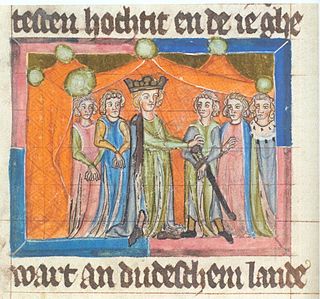
Year 1180 (MCLXXX) was a leap year starting on Tuesday of the Julian calendar.

Year 1160 (MCLX) was a leap year starting on Friday of the Julian calendar.

Year 1184 (MCLXXXIV) was a leap year starting on Sunday of the Julian calendar.

The Portuguese conquest of Ceuta took place on 21 August 1415, between Portuguese forces under the command of King John I of Portugal and the Marinid sultanate of Morocco at the city of Ceuta. The city's defenses fell under Portuguese control after a carefully prepared attack, and the successful capture of the city marked the beginning of the Portuguese Empire.

Buluggin ibn Ziri, often transliterated Bologhine, in full ʾAbū al Futūḥ Sayf ad Dawlah Bulukīn ibn Zīrī ibn Manād aṣ Ṣanhājī was the first leader of the Sanhaja Berber dynasty of Zirids to serve as viceroy of Ifriqiya under the Fatimid Caliphs, founding a dynasty that continued to rule the region after him.
This is a historical timeline of Portugal.
Halima Ferhat is a Moroccan historian, specialist in the Middle Ages of the Maghreb and professor at the Mohammed V University. She was also Director of the Institute of African Studies in Rabat.
Al-Qasim al-Ma'mun ibn Hammud was an Arab Caliph of Córdoba in Muslim Spain for two periods, 1018 to 1021, and again for a short time in 1023 until he was driven from the city. He hailed from the Banu Khazraj tribe. He was the brother of the deposed Ali ibn Hammud al-Nasir. His reign was described in Ibn al-Khatib's A'mal al-a'lam.

Honaine is a town and commune in Tlemcen Province in northwestern Algeria.

Yaghmurasen Ibn Zyan was the founder of the Zayyanid dynasty. Under his reign the Zayyanid Kingdom of Tlemcen extended over present-day north-western Algeria.

Alfred Bel was a French orientalist and scholar of Arab culture. He was the director of the Médersa de Tlemcen from 1905 to 1935.
Alain Ducellier was a French historian and professor emeritus at Université de Toulouse-Le Mirail who specialized in Byzantine studies and Christianity in the middle east. He was the author or editor of more than 40 books.
Michel Kaplan is a French medieval historian, docteur d'État, professor emeritus and former president of Pantheon-Sorbonne University. He is a Byzantinist specialising in history of mentalities, rural space and hagiography of the Eastern Roman Empire.
Pierre Guichard was a French historian, archeologist, medievalist, and academic. He specialized in Al-Andalus and western Muslims during the Middle Ages.
Ibrahim b. Ahmed b. Moharech b. Hamusk, known as Hemochico in the Christian chronicles, referred to simply as Ibn Hamušk, was a warlord in 12th-century Iberia. He was a close collaborator of his son-in-law Ibn Mardanīsh in the latter's resistance efforts against the Almohads. He betrayed Ibn Mardanīsh later in his life, siding with the Almohads.
The Almohad Caliphate launched a major offensive against the Kingdom of Portugal in the spring of 1190 that lasted into the summer of 1191. The Caliph Yaʿqūb al-Manṣūr crossed over from Africa to take personal command of his forces. The campaign of 1190 was underwhelming because of assistance Portugal received from passing armies of the Third Crusade. The sieges of Tomar, Santarém and Silves had to be abandoned, but the caliph overwintered in Seville. The campaign of 1191 reversed Portugal's recent reconquests, captured Silves after a second siege and pushed the frontier north to the Tagus.

The siege of Silves was an action of the Third Crusade and the Portuguese Reconquista in 1189. The city of Silves in the Almohad Caliphate was besieged from 21 July until 3 September by the forces of Portugal and a group of crusaders from northern Europe on their way to the siege of Acre. The defenders capitulated on terms, the city was handed over to Portugal and the crusaders took a portion of the spoils.

The siege of Alcácer do Sal lasted from 30 July to 18 October 1217. The well fortified city of Alcácer do Sal was a frontier outpost of the Almohad Caliphate facing Portugal. It was besieged by forces from Portugal, León, the military orders and the Fifth Crusade. The latter were led by Count William I of Holland. The expedition was the brainchild of Bishop Soeiro II of Lisbon, whose diocese was threatened by regular raids from Alcácer. King Afonso II of Portugal did not take part in person, but the city was incorporated into his kingdom after its capitulation. The crusaders who took part in the siege, mainly from the Rhineland and the Low Countries, did so without papal authorization and were afterwards ordered to continue on to the Holy Land.
The Battle of Ceuta took place in 1182, pitting the Portuguese and Almohad fleets off the coast of Ceuta. The Portuguese suffered a bitter defeat, losing a significant portion of their fleet, including their renowned admiral Fuas Ropinho.
The Battle of Cape Espichel took place in 29 July 1180 between the Portuguese and Almohad fleets off the coast of Setúbal. The Portuguese left the battle victorious and it marked their first naval battle in history.









